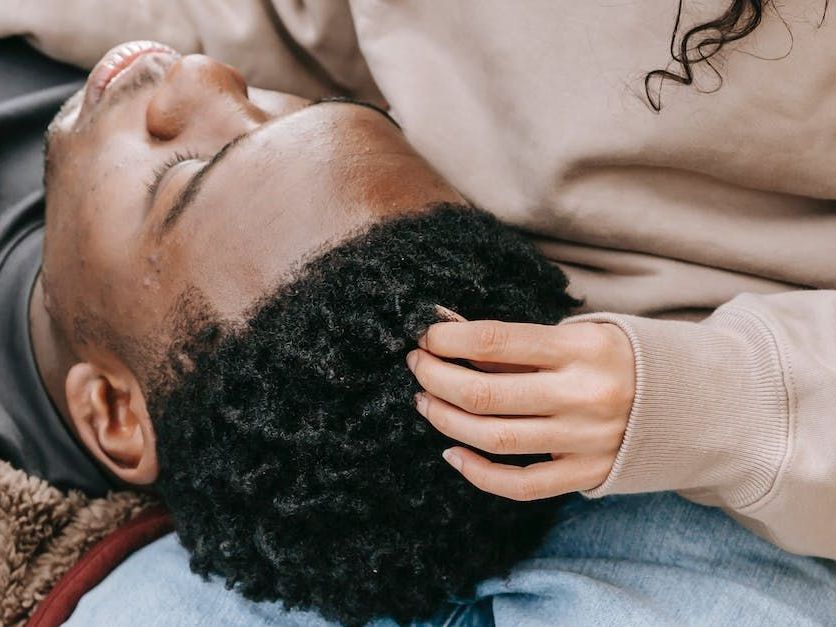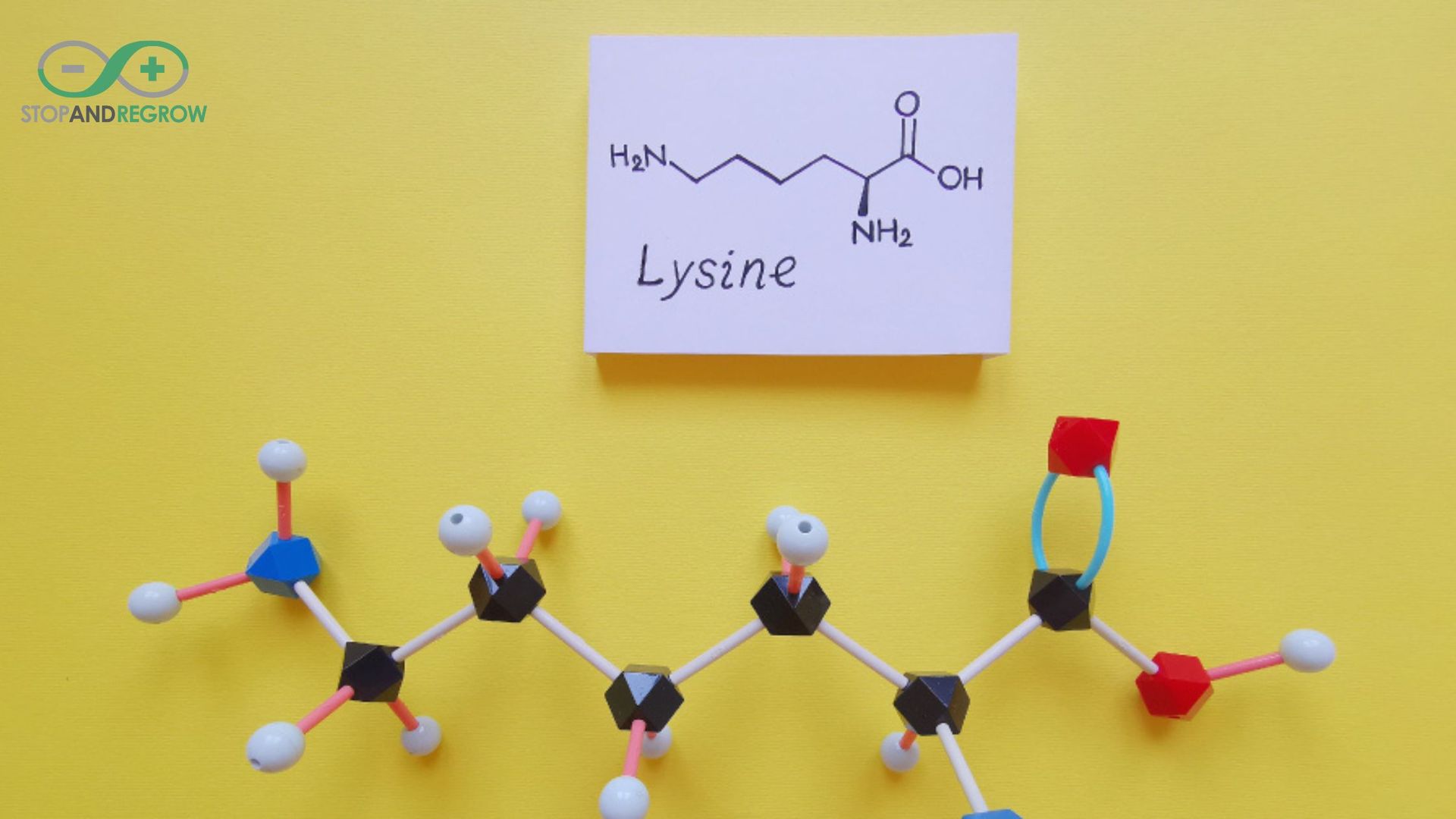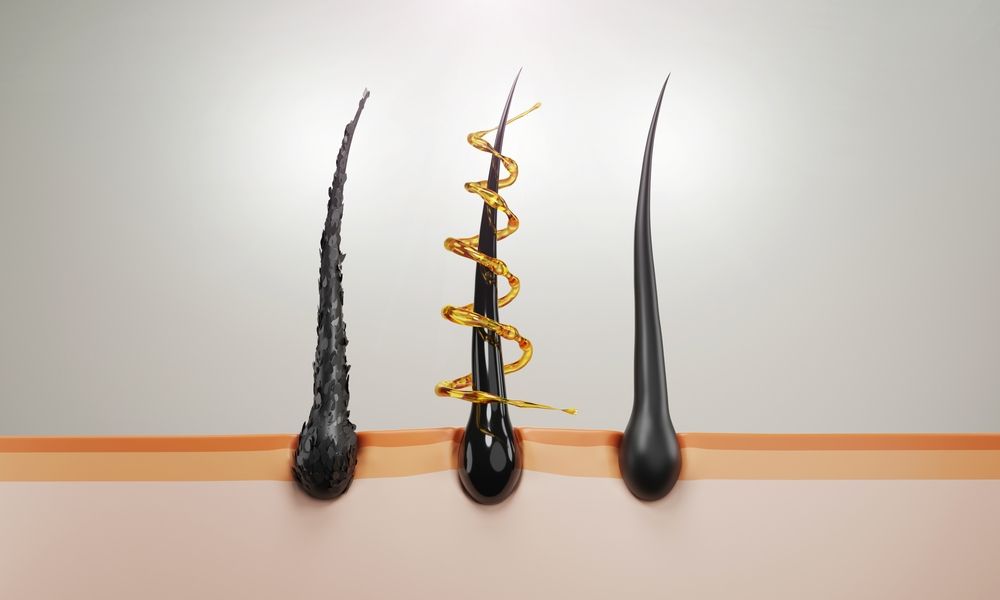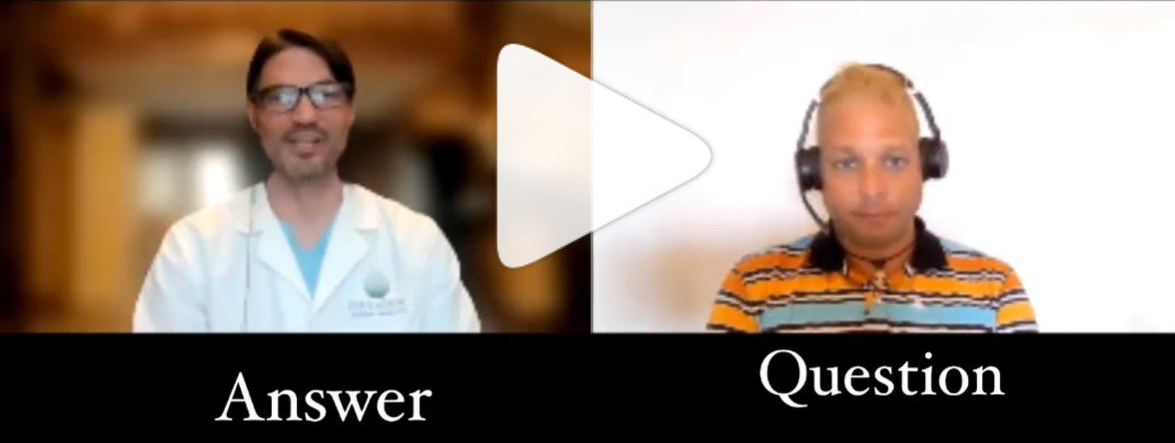Hair Loss in Men and Women with Dr Nettles - eHealth Network Podcast Interview
Dr Nettles Discusses the 5 Nettles Zones & How To Tell If You Have Hair Loss.
This is the eHealth radio network, your source for health advice on demand. And now your host, Eric Michaels.
Eric Michaels - eHealth Radio Network 0:02
Thanks for joining us once again here on the health Radio Network. This is your host, Eric Michaels. Today on the program. We're speaking with the internationally acclaimed Dr. Ray nettles. After 25 years of dedicated research, development and clinical treatment, Dr. Nettles has developed a new generation of precision medicines that are personalized, proactive and reverse the hair loss process in what is the most revolutionary medical breakthrough of our time. Looking forward to hearing the details and Dr. Nettles, thanks for joining us here today.
Dr Ray Nettles - Stop and Regrow 0:40
Well, Eric, Dr. Nettles, nice to be here. And thank you for having me on your show. And it sounds like with that introduction, I'd need nothing else to say.
Eric Michaels - eHealth Radio Network 0:50
I'm sure there's plenty you could say and but this, the introduction is very deserving. So we really do appreciate your time. And joining us here today.
Eric Michaels - eHealth Radio Network 0:59
So tell us as we kick things off, what are the typical five zones affected by hair loss?
Dr Ray Nettles - Stop and Regrow 1:04
Yeah, so we started out when I learned in medical school, they were called Norwood patterns. And boy, Eric, I did my best to understand Noor Woods thought patterns before He created them, but it never really made any sense to me. So over the course of two decades, and following hair loss over time, and dealing with clients as young as 15 years old, and as old as 88 years old, my youngest client is 15 years old, and the oldest client that started on the program is 88 years old. So hair loss can happen at any point in time. But we've had a chance to follow the patterns over time. And we call these Nettles Zones there, just because my last name happened to be Nettles. So they're Nettles Zones. But if you start looking at hair loss in, in people, you'll start to see those five zones. So the front three zones are the hairline. And people start to talk about the hairline receding, well, it recedes in the corners, right, the temple areas that's zones one in three, and then that middle piece would be zone two. So the 123 is the hairline. And that starts to recede backwards. So when hair starts to regrow, it's going to return in the opposite fashion. Now, zone four is that piece right on top of the head. So 123 is the front hairline. The next piece is that little patch on top of the head, the vortex, that would be zone four. Now zone four does not recede. Where could it go air, it's got no place to go. So it does what's called miniaturization in unison. So that hair on top of the head will be 100% as thick as it should be when you're a child, and then it becomes 90, 80, 70, 60, 50. When it becomes 50% as thick as the original, the patient notices for the first time that they have hair loss, it's the 50% of loss where they start to see it. zone five is that little circle on top of the head that a lot of people are covering up with baseball caps, right. So that little piece on top, that's the crown. And that crown, it starts out with a little small circle right in the very center. And then it slowly that circle slowly opens up. When people come in Eric with their full hand missing that whole piece back there. They say doc just put some right in the center. I say that's going to be the last to come back because it was the, first to go. Does that make sense?
Eric Michaels - eHealth Radio Network 3:41
It certainly does make sense and a great visual on that in every regard. Well done on that. Now how can someone detect the early signs of hair loss?
Dr Ray Nettles - Stop and Regrow 3:50
You got it right there. Everyone looks in the morning mirror right Eric. So everyone's looking in the morning mirror. So I say right, there's the best chance to take a look right? Now the problem was with visualizing hair loss is you're looking at hair at least once a day in the mirror, sometimes two and three times. How could you perceive hair thinning over the course of hours not even possible. But over the course of time you can. So I always tell people look in the mirror and look at that hairline. Take a couple of hairs push down on them with your finger. Okay, if they press down and they can't press back up, they're getting thinner over time. When you look at your hairline you should have zero baby hairs. You should have zero miniaturized hairs. Every hair at the hairline should be exactly as thick as the neighbor. So when you look into the front hairline, which everyone's looking into the morning mirror, if you notice and perceive any hair follicles that are thin, you have genetic hair loss, that's called miniaturization. So the hairs start out thick when you're a child. They slowly miniaturize and then bald and then they go backwards miniaturize bald and go backwards. So always look at that hairline. If you see baby hairs coming, that's going the wrong direction.
Eric Michaels - eHealth Radio Network 5:11
And that is some very helpful information on that right there. Thanks for that. Now, how can someone get started with their hair growth journey? And if you would explain what's there they are in your program, getting their bloodwork interpreted?
Dr Ray Nettles - Stop and Regrow 5:25
Good question, Eric. People call and they say, Hey, doctor, I know I have hair loss, I saw a picture from last year, my friends told me, my wife told me, my kids told me, I can see it in the mirror. Now that you know you have hair loss, you want to get started doing something to stop it. Stop hair loss from thinning, and then you want to regrow some of the thin hairs thicker. So the company's called - what do you think get stopped and regrow. So we're the number one SEO program on earth because we named our program stop and regrow. So once you see that you have a problem with hair loss. You don't go to the store and get started on something, because getting started on something, without being precise could be the wrong thing and that could damage your hair. So the first thing you need to do is figure out what caused it. What causes any condition or any disease on Earth today, will be found inside your blood. So you must get blood work. The problem with blood work is we have patients that come in and say I had my doctor do blood work last week. Well, Eric, I wish everybody could run the same tests that there's 4000 different tests that I could run on that bloodwork. If I ran 4000 tests, it would cost about $65 million. So we put together nine panels, which are very important. Our nine panel bloodwork tests costs around $1,800. Okay, we have a health member price, for that price its reduced by $1,400. And that price would be $395. We're going to look at blood work and we're going to evaluate what's called biomarkers in your blood. And we're going to tell you what you eat based on what we see in your blood work. We know what percentages of protein, fat and sugars that you consume, we will teach you through the PowerPoint slides how nutrition turns into what's called biochemistry inside your body. Hormones are messengers that are made from the amino acids and the fatty acids, which are comprised inside the bloodstream. So we're going to do a nine panel bloodwork test and teach you in one hour how nutrition contributed to genetics. But Mom and Dad's genetics caused the hair loss. We then after getting blood work can send over your blood work to the pharmacy, and the pharmacy can use all of their molecules to regulate all of the chemistry. So Eric, the best way to think about it is your body is a swimming pool. And you've got some things that are out of balance, and you got to put a cup of something in there so that you can rebalance all that water. The human body is comprised of 70% water with a little bit of those molecules inside. We've got to just get that water rebound, once I get the water rebalance, and the water is optimized, then the hair cells will respond and start to regrow. People also noticed that their muscle cells respond and get stronger, their skin cells respond and look better, so everything will get optimized inside your body once you optimize the chemistry. So people mostly come for hair loss Eric, but they stay for health, because we are a health company that happens to be able to treat hair.
Eric Michaels - eHealth Radio Network 8:48
We're really appreciative of your visit with us here today and all the information shared so far. Looking forward to hearing a little bit more today we're speaking with Dr. Ray nettles, who creates customized solutions to stop hair loss and regrow thin hair based on each patient's unique presentation and needs. Thereby stopping hair loss and regrowing thin hair here on the health radio's hair loss information channel part of the eHealth radio network. Now, Dr. Nettles, how long does it take for a patient to see new hair growth? And does the growth sustain over time?
Dr Ray Nettles - Stop and Regrow 9:17
Very good question, Eric. When will someone see their hair regrow over time? If they do not take pictures? Eric, you will not see it. Once again. We touched on this earlier. You're looking into that morning mirror every day. It's hard to perceive what's going on. Every patient that starts with us, the first thing we do Eric is we get what's called the baseline photo. And then I show you pictures over the next six, nine and 12 months. The first six months you will see nothing. Why? Because we're adding something into your body to improve the recipe. So recipes come from mom and dad's genetics which are inside your DNA, but they're missing something called the genetic defect and a deficiency. So we must supplement with a molecule that goes inside the body repairs the genetic damage, then that repairs and forms a better formed enzyme that is normal, that normal enzyme will go inside the hair cell, it will reprogram the hair cells (gotta kick out the old one), right, Eric. So the old hair cell has the wrong programming, we're going to change the chemistry and then we're going to change and reprogram the hair cell that takes about three, four or five months. So for the first couple of months, nothing is going to be visible. And then I say give me another six months, once we get you rebalanced, then we will see hair grow. Once the hair follicles have all grown as thick as they are, you've probably seen pictures of myself, all of my hair follicles are terminal, and they're all stick as they can be. Once you reach that terminal phase, then you can maintain the hair what's called the maintenance phase. So we've got a topical which has a very expensive molecule, which I discovered during my ophthalmology fellowship. The molecule grew lashes, we studied it 22 years ago, and we found the molecule that grew hair. So one molecule is going to be a growth stimulant, the other molecule is going to maintain the chemical balance from the inside of the body. We're going to use both of the molecules to get started because we're going to stop it and we're going to regrow it. Once you've regrown all of your hairs as thick as they possibly can be, we remove that growth molecule, and we stay on with the maintenance molecule.
Eric Michaels - eHealth Radio Network 11:40
Really appreciate the expectation there on hair growth and what to expect over time. Now the big question is, do you see patients only in your office? Or can patients see you virtually?
Dr Ray Nettles - Stop and Regrow 11:52
Very good question, Eric. So during the pandemic, a lot of things have changed. There were quite a few challenges. But there are some silver linings, we now have the ability to see patients from all over all parts of the globe. We have clients now on six continents. So in the United States, we have two licensed pharmacies, one on the East Coast, one on the West Coast, that takes care of most of the United States population. But as you reason we have now patients from all over that want to come in. So if you're located outside of the United States, we can set up a one year supply, those patients will fly into the United States, we will put together a one year supply, they will then take that home, the medical supplements and molecules will last for the year. Some patients in Australia and the UK, they have a relationship with the customs where our medicines can get into some of their countries. So if you're outside of the United States, the best thing to do is to go to stopandregrow.com. Reach out to our team and ask us your country. One of the countries that we can ship to and if not, you could perhaps write a letter to your senator and your President and ask them if they would like to get Dr. Nettles hair regrowth program into their country and we'll do our best to support
Eric Michaels - eHealth Radio Network 13:12
Dr. Nettles, we certainly appreciate all you do in the space and for joining us here today. Listeners for more details, simply visit stopandregrow.com. Dr. Nettles all the best and thanks so much for joining us here today on eHealth. Radio.
Dr Ray Nettles - Stop and Regrow 13:26
Thank you very much for your time and what you're doing, Eric we and people appreciate it keep up the good work.
Eric Michaels - eHealth Radio Network 13:31
Certainly appreciate those kind words. It certainly means a lot. We've been speaking with Dr. Ray nettles, who creates customized solutions to stop hair loss and regrow thin hair based on each patient's unique presentation and needs, thereby stopping hair loss and regrowing thin hair. And for all the details, simply visit stopandregrow.com.
Eric Michaels - eHealth Radio Network 13:53
And again, this has been your host Eric Michaels and we do thank you for your continued support of the health Radio Network. Join us again soon for another episode that will help further expand your knowledge on those things that are important to your health and wellness. For more eHealth radio reports we invite you to visit our main radio channel site and health Radio network.com. And as always, we do thank you for tuning in. Thanks for tuning in to the eHealth radio network. For more information or to subscribe to this podcast, visit eHealth radio network.com
If you are interested to getting your own Biochemical Report Card to learn about all the biomarkers contributing to your hair loss, you can book a free hair regrowth consultation to learn more here.
Take our quiz to learn if Stop and Regrow will work for you here.
Recent Articles From Our Blog








By providing your SMS number you opt in to receive occasional text messages from us. We will not ever sell or provide your data to third parties and you may opt out at any time.. Message and data rates may apply.. SMS Terms & Conditions


